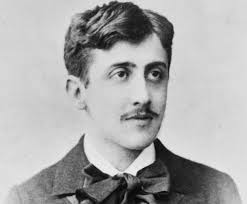I first read the seven volumes of Marcel Proust’s In Search of Lost Time spring through autumn of 1997. A couple of years later, I read the collection of Proust’s essays in On Art & Literature: 1896-1919. Looking back over my notes on the text, I can see how significant Proust was for me in the two works (Mev, Layla) that came after my Elie Wiesel book, on which I was working at the time of this reading. I was particularly drawn to Proust’s criticism of the French critic Sainte-Beuve.
Should I make it a novel, or a philosophical study — am I a novelist?
Every day I set less store on intellect.
And if intellect only ranks second in the hierarchy of virtues, intellect alone is able to proclaim that the first place must be given to instinct.
At the same time I put myself in tune with those other realities for which solitude whets the appetite, and whose possibility, whose reality, gives a value to life: the women one does not know.
[Sainte-Beuve’s method] ignores what a very slight degree of self-acquaintance teaches us: that a book is the product of a different self from the self we manifest in our habits, in our social life, in our vices. If we would try to understand that particular self, it is by searching our own bosoms, and trying to reconstruct it there, that we may arrive at it. Nothing can exempt us from this pilgrimage of the heart.
One regards oneself as no more than the trustee, who from one moment to the next may disappear, of an intellectual hoard which will disappear with him; and one would like to say check to one’s previous idleness or force of inertia by obeying that noble commandment of Christ’s in the Gospel of Saint John: “Work while ye have the light.”
Flaubert’s conversations with his niece…. is the product of a quite superficial self, not of the innermost self which one can only recover by putting aside the world and the self that frequents the world; that innermost self which has waited while one was in company, which one feels certain is the only real self, and which artists — and they only — end by living for, like a god whom they less and less often depart from, and to whom they have sacrificed a life that has no purpose except to do him honor.
I catch sight of one of those beings whose particular face tells me that a new happiness is possible. Beauty multiplies the possibilities of happiness by its particularity. Each being is like an unsurmised ideal that opens before us, and to see a delightful face going by that we do not know opens up a prospect of new lives we long to be living. They disappear at the turn of the street but we hope to see them again, we are left with the thought that there are a great many more lives to be lived than we supposed, and this enhances our self-esteem. A new face that has gone by is like the charm of an unvisited country which a book has disclosed.
[T]here is only one way of writing for the many, and that is to write without respect of persons and for the sake of what is deep and essential in oneself…
No matter if they should say: You’re wasting your skill on this. What we are doing is making our way back to life, shattering with all our force the ice of the habitual and the rational which instantly congeals over reality and keeps us from ever seeing it, is finding a passage back into the open sea.
There was no dividing line between real life (which as you and I think, is not real) and the life in his novels (which for the writer is the only true life).
[Goethe’s] narrative is often interrupted by an extract from a diary, or a book of Reflections kept by one of the characters.
Books are the work of solitude and the children of silence.
The fine things we shall write, if we have talent enough, are within us, idly, like the remembrance of a tune which charms us though we cannot recall its outline, or hum it, nor even sketch its metrical form, say if there are pauses in it, or runs of rapid notes. Those who are haunted by this confused remembrance of truths they have never known are the men who are gifted; but if they never go beyond saying that they can hear a ravishing tune, they convey nothing to others, they are without talent. Talent is like a kind of memory, which in the end enables them to call back this confused music, to hear it distinctly, to write it down, to reproduce it, to sing it. There comes a time in life when talent, like memory, fails, and the muscle in the mind which brings inward memories before one like memories of the outer world, loses its power. Sometimes, from lack of exercise or because of a too ready self-approval, this time of life extends over a whole lifetime; and no one, not your own self even, will ever know the tune that beset you with its intangible delightful rhythm.
For it is not in our diaries but in our books that we record ourselves, our true selves.

1 Comment